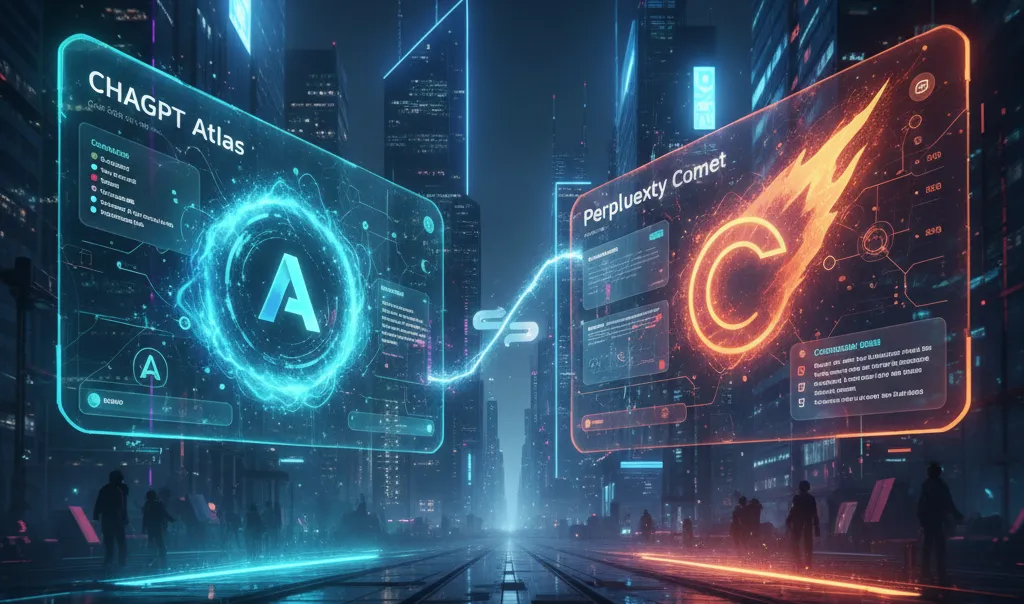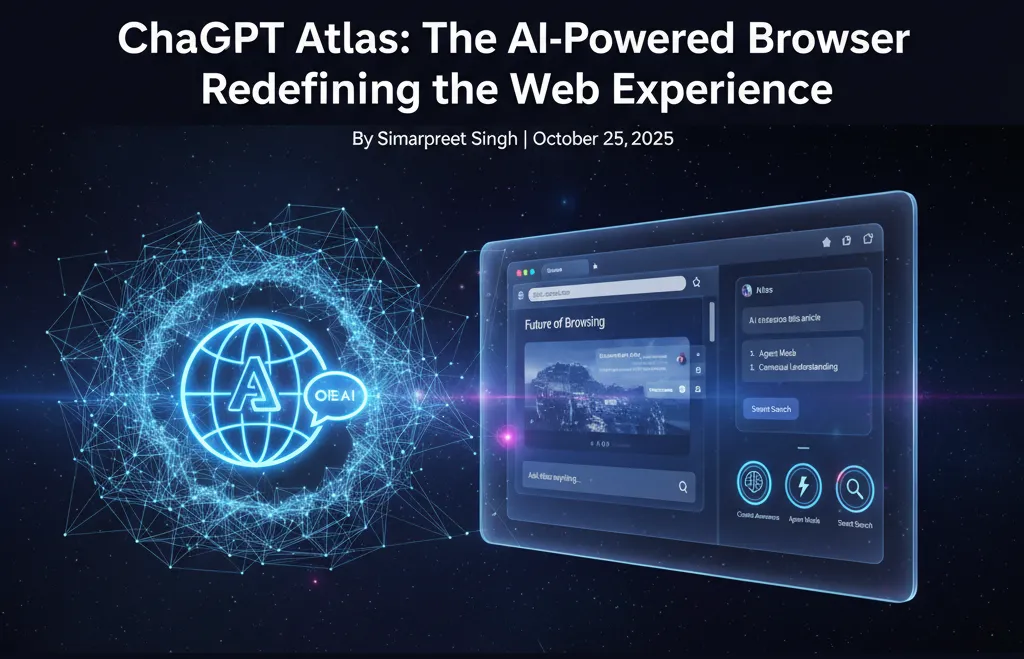
ChatGPT Atlas vs Perplexity Comet: The AI Browser Showdown
by Simarpreet Singh
Overview
The rise of AI-powered browsers marks a new era in human-computer interaction. OpenAI’s ChatGPT Atlas and Perplexity AI’s Comet are at the forefront — both embedding artificial intelligence into the web experience, but with distinct philosophies: Atlas focuses on productivity and automation, while Comet emphasizes precision and factual discovery.
What is ChatGPT Atlas?
ChatGPT Atlas is OpenAI’s AI-enhanced browser that merges browsing, research, and automation into one platform. Powered by GPT-5, Atlas turns every tab into a conversational workspace. Whether you’re summarizing articles, booking flights, or researching topics, Atlas allows you to interact directly with the web using natural language.
What is Perplexity Comet?
Perplexity Comet is a research-focused AI browser by Perplexity AI. It builds upon the company’s advanced retrieval and reasoning system to provide citation-rich, transparent answers. Instead of summarizing random pages, Comet verifies data against trusted sources, making it ideal for students, professionals, and fact-driven researchers.
How They Differ in Philosophy
🧠 Atlas: Designed for action and automation — think task completion and contextual summaries.
📚 Comet: Designed for accuracy and transparency — think deep research and verified knowledge.
⚙️ Atlas: Helps you do things faster online.
🔍 Comet: Helps you understand things better online.
Core Features Comparison
💬 AI Model: Atlas runs on GPT-5 (multi-modal), while Comet uses Perplexity’s retrieval-augmented LLM.
🌐 Web Interaction: Atlas can automate actions on live web pages; Comet focuses on structured, cited results.
🧩 User Interface: Atlas resembles a modern Chrome-style browser with AI chat; Comet follows a Q&A-style interface.
🧠 Memory & Context: Atlas uses contextual memory for personalization; Comet prioritizes factual accuracy.
📄 Data Sources: Atlas browses freely; Comet cross-verifies through academic and journalistic sources.
⚡ Performance: Atlas leans on Chromium’s engine; Comet emphasizes minimalism for faster responses.
Use Cases for Each Browser
🔍 ChatGPT Atlas: Perfect for creators, developers, marketers, and multitaskers who need real-time assistance or automation.
📚 Perplexity Comet: Best for researchers, students, analysts, and professionals who value verified, citation-based insights.
Feature Comparison Table
| Feature | ChatGPT Atlas (OpenAI) | Perplexity Comet (Perplexity AI) |
|---|---|---|
| Focus | Productivity & Automation | Research & Knowledge Discovery |
| Core AI | GPT-5 | Perplexity LLM + Retrieval Engine |
| Web Access | Full browsing & task automation | Verified data search only |
| Agent Mode | Yes (AI performs actions) | Limited (static Q&A) |
| Transparency | AI reasoning explained contextually | Source citations for every answer |
| Design | Conversational + browser hybrid | Research dashboard interface |
| Ideal Users | Professionals, creators, coders | Students, researchers, analysts |
Strengths of ChatGPT Atlas
⚡ Automation First: The Agent Mode can perform actions like booking tickets or submitting forms.
🧠 Context Understanding: Atlas knows what’s on your screen and responds intelligently.
💬 Conversational Workflow: You can ask questions without leaving your current page.
🛠️ Productivity Boost: Ideal for workflows involving research, documentation, and task switching.
Strengths of Perplexity Comet
🔍 Transparency: Every piece of information is backed by cited sources.
📚 Research Accuracy: Excellent for academic or data-driven work.
🧠 Focused Simplicity: A clean, distraction-free interface for deep thinking.
🧩 Explorative AI: Encourages curiosity through related topic exploration.
Challenges and Limitations
🔐 Atlas: Users may worry about automation accuracy and memory privacy.
⚖️ Comet: Its limited action capabilities make it less versatile for daily productivity.
🧩 Atlas: Early-stage Agent Mode may not support all websites.
📄 Comet: Some users may find the Q&A format restrictive for open browsing.
The Future of AI Browsing
Both ChatGPT Atlas and Perplexity Comet represent the dawn of AI-powered web exploration. Atlas aims to turn the browser into a personal assistant, capable of acting and learning. Comet envisions the web as a verified knowledge graph, where every answer is grounded in facts. The next evolution may blend both — a future browser that’s as intelligent as Atlas and as transparent as Comet.
Conclusion
The competition between ChatGPT Atlas and Perplexity Comet is not about who wins — it’s about what kind of internet you prefer. If you want an intelligent partner that performs tasks and automates workflows, choose Atlas. If you want a trustworthy research companion that validates facts and builds understanding, go with Comet. Either way, the future of browsing is undeniably intelligent.
FAQs
Which browser is better for productivity?
ChatGPT Atlas is better for productivity-focused users due to its automation and Agent Mode capabilities.
Which browser provides more accurate information?
Perplexity Comet is designed for verified, source-cited answers, making it ideal for accuracy and academic use.
Can I use both browsers?
Yes, many users combine Atlas for everyday browsing and Comet for research-focused tasks.
Does Atlas have source citations like Comet?
Atlas provides contextual references but is more focused on live page understanding and task automation.
Are both browsers free?
Both offer free versions with premium upgrades — Atlas Plus/Pro for Agent Mode, and Comet Pro for enhanced research capabilities.


